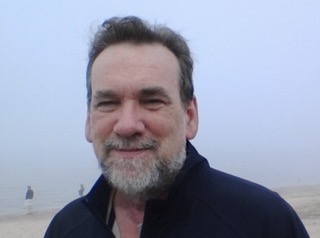Peak Performance: “Succession” Creator Jesse Armstrong on Trading Media Empires for Tech Titans in “Mountainhead”
Jesse Armstrong takes his exploration of the rich and powerful to new heights—both literally and figuratively—in Mountainhead. In his feature directing debut, the writer/producer who created HBO’s Emmy-winning, zeitgeist-capturing Succession about the family turmoil of the media mogul Roy family, turns his satirical eye on the titans of tech. And it all takes place at the top of a snow-covered Utah summit in a breathtaking, multimillion-dollar estate that gives the movie its name.
Debuting on HBO MAX on May 31, Mountainhead opens with a mighty tech quartet meeting for a weekend of bro bonding and boasting about their triumphs. Randall (Steve Carell), the patriarch, often referred to as Papa Bear by his younger acolytes, made his fortune in defense and weaponry. Venis (Cory Michael Smith), the foursome’s rising star and richest member, has recently launched a generative AI social media platform that is taking the world by storm. Jeff (Ramy Youssef), a tech wizard, developed a program that can mitigate the potential risks of AI, a “filter for nightmares.” Despite hosting the event in his new digs that make Zeus blush, Hugh Van Yalk (Jason Schwartzman) goes by “Souper,” as in somebody who works at a soup kitchen, because his wealth is measured in millions, not billions. He is hoping to convince his colleagues to fund a wellness app that will elevate him to their level of success.
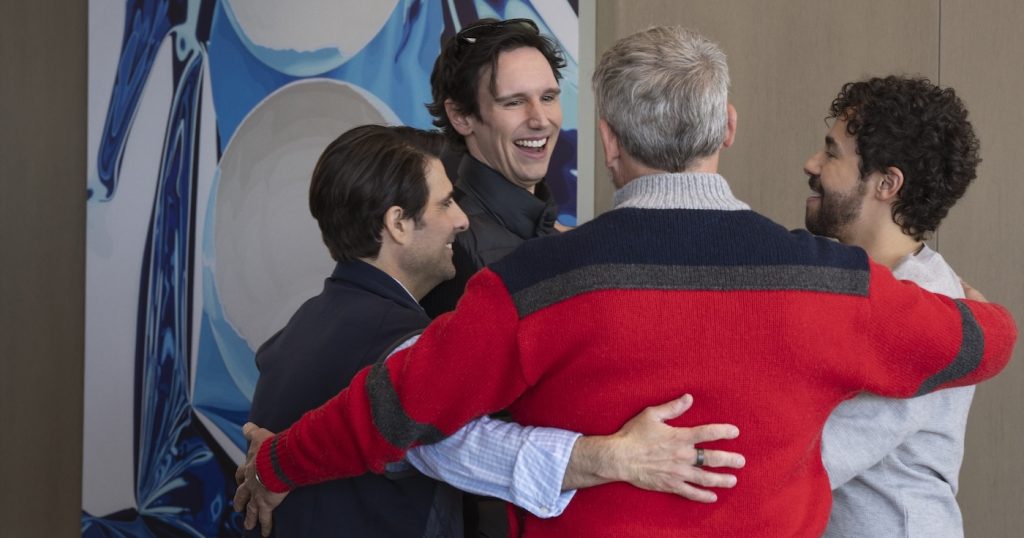
As the weekend unfolds, the men discover that Venis’ recently launched AI tool is being co-opted to wreak havoc around the world. Racial animosity is escalating, causing violence, rioting, and looting. Governments are teetering towards collapse. The mayor of Paris is assassinated. Instead of being horrified, the four see an opportunity. How wonderful a world it could be if they controlled everything themselves. The question is — will divisions among them squelch these plans before they can be put in motion?
After four seasons of Succession, the last thing Armstrong intended to do was another tale of influence and arrogance. But as fate would have it, he accepted an assignment to review a book about cryptocurrency king Sam Bankman-Fried. Armstrong’s curiosity piqued.
“That professional bell started ringing in my head,” says Armstrong during a Zoom conversation. “I was consciously keen not to do another rich people thing, but sometimes you find that the subject picks you. I began reading biographies and histories of Silicon Valley. On podcasts, you can listen to their tone of voice…the level of confidence, consequentialism, and power in the world. I couldn’t get their voices out of my head.”
Before committing to a script, Armstrong wanted to pitch the idea to gauge interest. With the basics in his head—four guys in a snowy getaway as global upheaval ensues—he showed it to Succession colleagues Lucy Prebble, Jon Brown, Tony Roche, and Will Tracy. With their input, Armstrong fashioned a story. In January, Armstrong took it to HBO. CEO Casey Bloys quickly said yes.
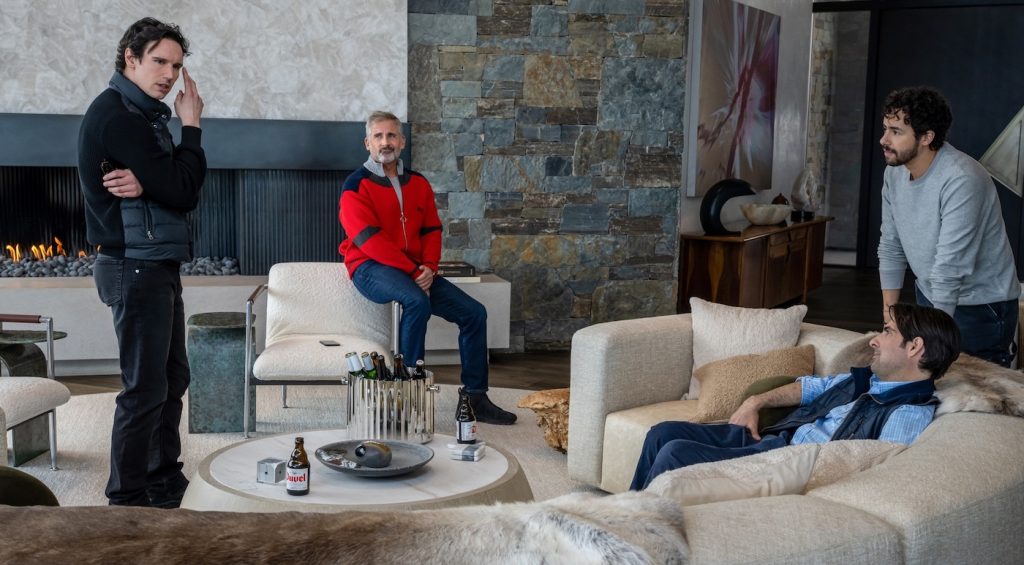
Before you could say “greenlight,” Armstrong found himself in the mountains of Utah and Vancouver, Canada, looking for a house that could serve as Mountainhead. But with everything happening so fast, one thing was falling to the wayside.
“I was trying desperately to start writing, but we’d fired the gun on production. I was location scouting and writing in the back of vans,” Armstrong remembers. “Eventually, when we still hadn’t found the house, I said to Marcel Zyskind, the cinematographer, production designer Stephen Carter, and producer Jill Footlick, ‘Can you carry on looking? I just need to write this because otherwise we’re going to find a house and there’s not going to be a script.”
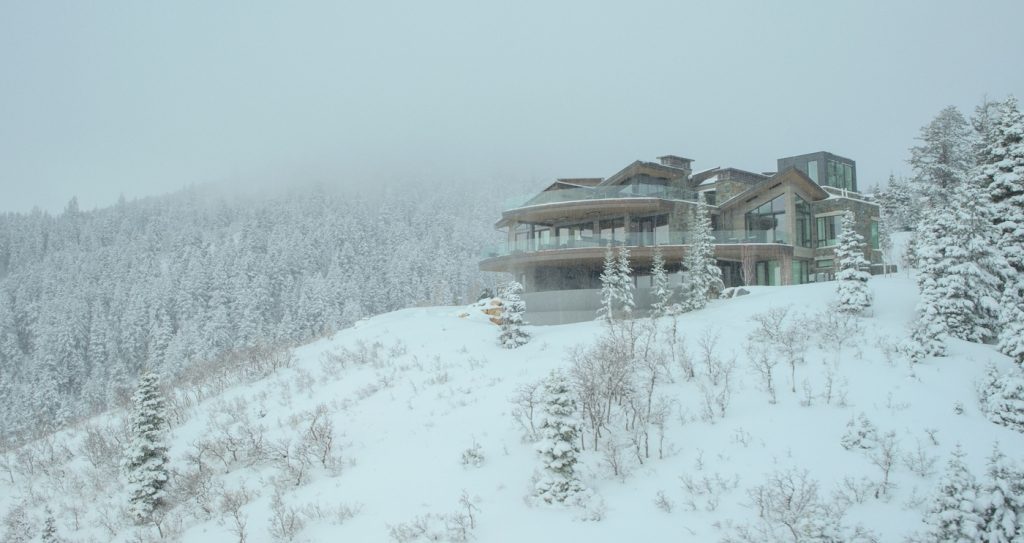
Ultimately, a location was found — a private home in the gated Deer Crest neighborhood of Deer Valley, Utah. Concurrently, the veteran writer, who in addition to winning five Emmy Awards for his work on Succession, scored an Oscar nomination for Best Adapted Screenplay for In the Loop, drafted a script.
The production schedule for a May premiere was tight. Preproduction started in February. Filming took place in March. For Armstrong, it presented an opportunity.
“Normally, I love collaborating. But I knew the tone of this and to cut out some personnel and communication loops, I’d direct it myself,” says Armstrong. “It was rather a different tone to Succession, but I knew shooting it in a similar way would be amenable. So I felt safe. I’d learned how the two-camera situation works, and we were going to do it largely in one location. ‘Oh yeah, this is conceivable.’”

Armstrong’s Succession experience proved invaluable.
“It’d be impossible for me to imagine doing such an endeavor without it,” says Armstrong. “I grew so much from being a British sitcom writer into being comfortable around a large crew. I knew the individuals in the sound department, the script supervisor. These were all people from Succession. It gave that feeling of familiarity.”
Armstrong invited Mark Mylod, who has two Emmys for directing Succession episodes, to be an executive producer. Mylod lent advice and helped put together the crew. Even so, making the leap to director did present a whole new challenge.
“A showrunner has an advantage. You’re around sets a lot,” Armstrong continues. “But I was surprised at how that director’s title takes it to another level. The crew is looking to you. The actors place a lot of trust in you. The writer offers the raw materials. But the director is the one there saying, ‘It’s going to be okay. I know what we want.’ So I felt that responsibility, especially because I didn’t necessarily have the experience. I had to subtly convince them with my demeanor. I never like bullshitting people, but for that moment, it’s a little bit fake it till you make it. You have to sort of pretend to be a director until you are one.”
The location was a plus. From its sweeping snowcap Utah vistas to such amenities as an indoor bowling alley, basketball court, and a towering staircase that soared several stories, Armstrong couldn’t have imagined a better playground for Mountainhead.
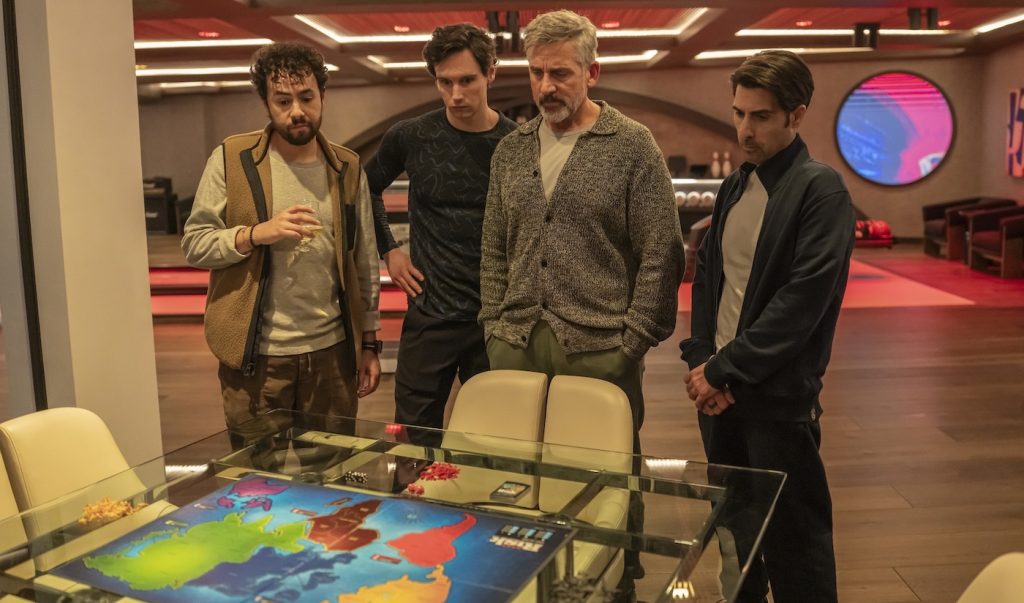
“For some reason, I always wanted this snowy, slightly icy, sequestrated away environment. It offered us that at a rich people’s scale,” says Armstrong. “I adapted the script once I saw the stuff there. It was fun to write to a massive house burrowed out of the rock.”
Randall, doing his morning yoga in the middle of the cavernous basketball court, and Venis bowling melons down the bowling alley were both inspired by the estate. Armstrong set a pivotal moment in the drama at the top of the dizzying staircase. A sitcom veteran of such series as Peep Show and Fresh Meat, he couldn’t resist adding a bowling ball joke.
“There’s a bit where Steve gives a mock heroic speech that references stuff like being at the doorway of Octavian,” Armstrong remembers. “And at the last minute, Jon Brown, my writing and producing colleague, and I were laughing, ‘Wouldn’t it be funny to undercut it by saying, ‘Have you got the bowling ball?’ And the way that Jason and Steve did that joke…with no time to consider it…seeing them hitting a perfect comic tone on the fly was just a very pleasing experience to watch.”
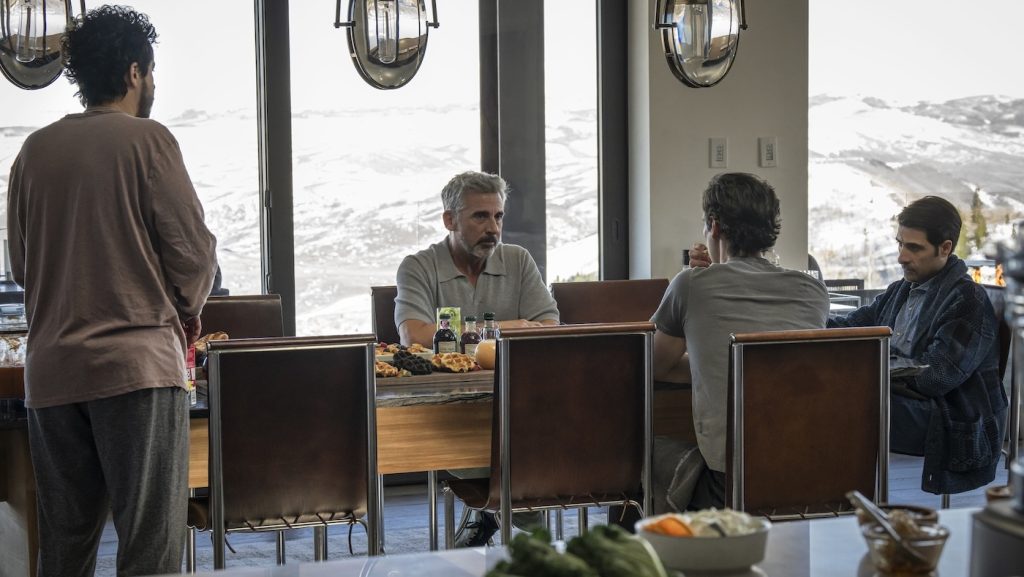
Armstrong adds that the leads gave a novice director more than he could have expected from the characters he created.
“I cast them because they’re the best in the world. This was a long script. It’s almost like a play. There are a huge amount of words which, if they hadn’t nailed on a basic technical level early, we would have been in big trouble,” explains Armstrong. “Without being too reductive about it, there’s a little bit of Frankensteining in the writing. They have those archetypes, but there are also these Frankensteined business stories and emotional relationships. What a great actor does is take those things—maybe you’ve sewn together a leg of this and an arm of that—and make it into this real person. Suddenly, you’re watching four real people interact on a set. There’s no other way to describe it other than just a delightful play happening before your eyes.”
Mountainhead is streaming on HBO Max.
Featured image: Cory Michael Smith, Steve Carell, Ramy Youssef, Jason Schwartzman. Photograph by Fred Hayes/HBO


